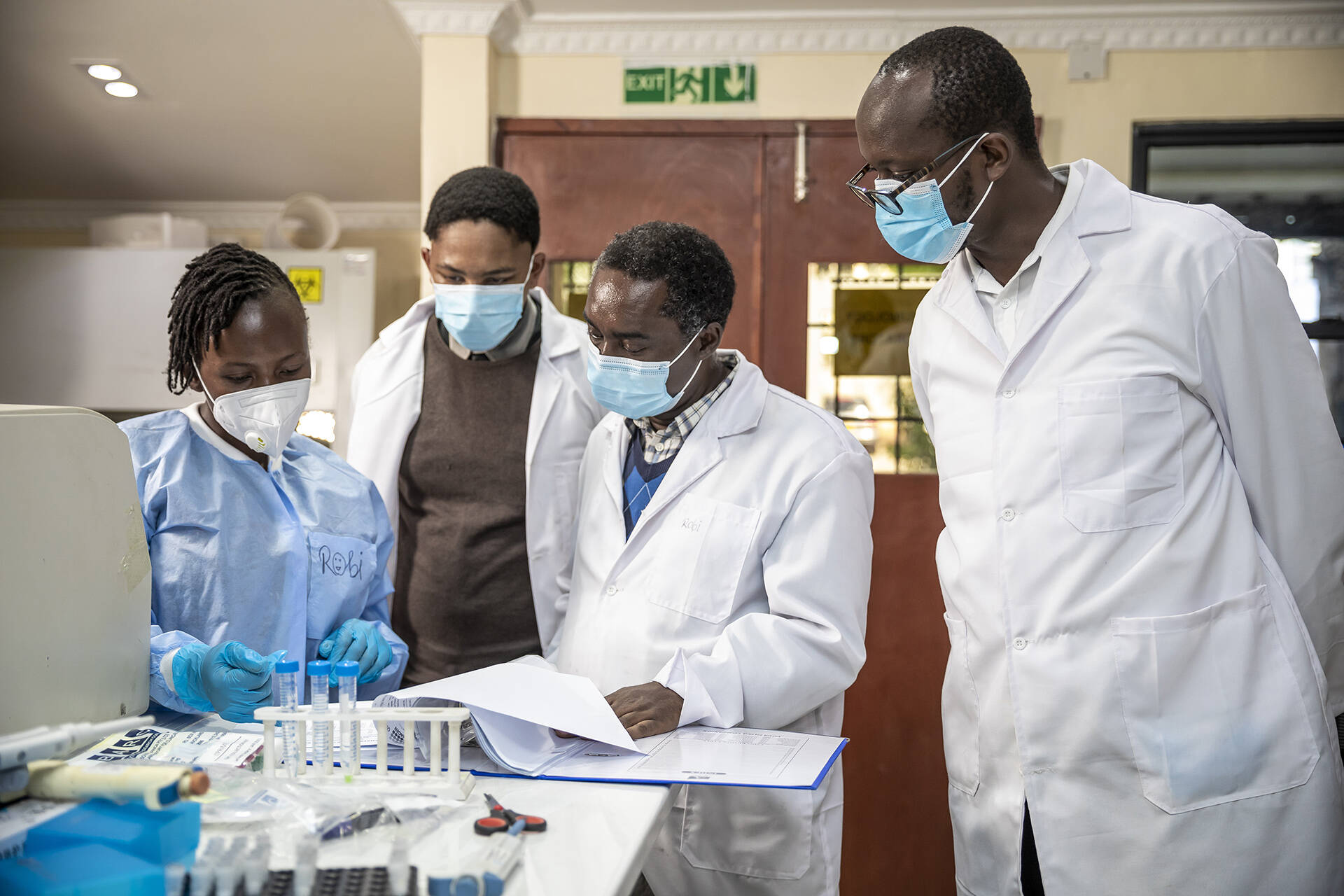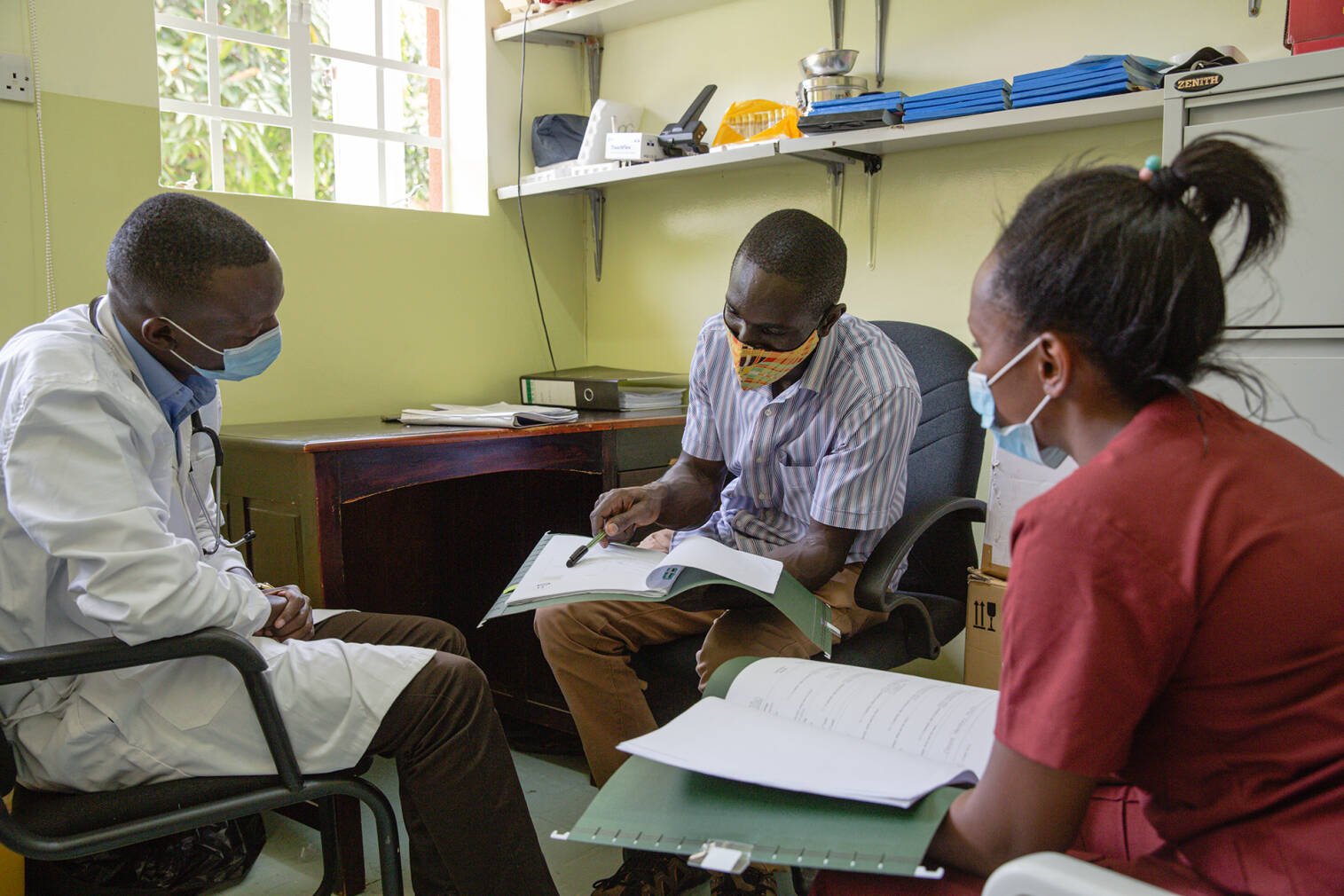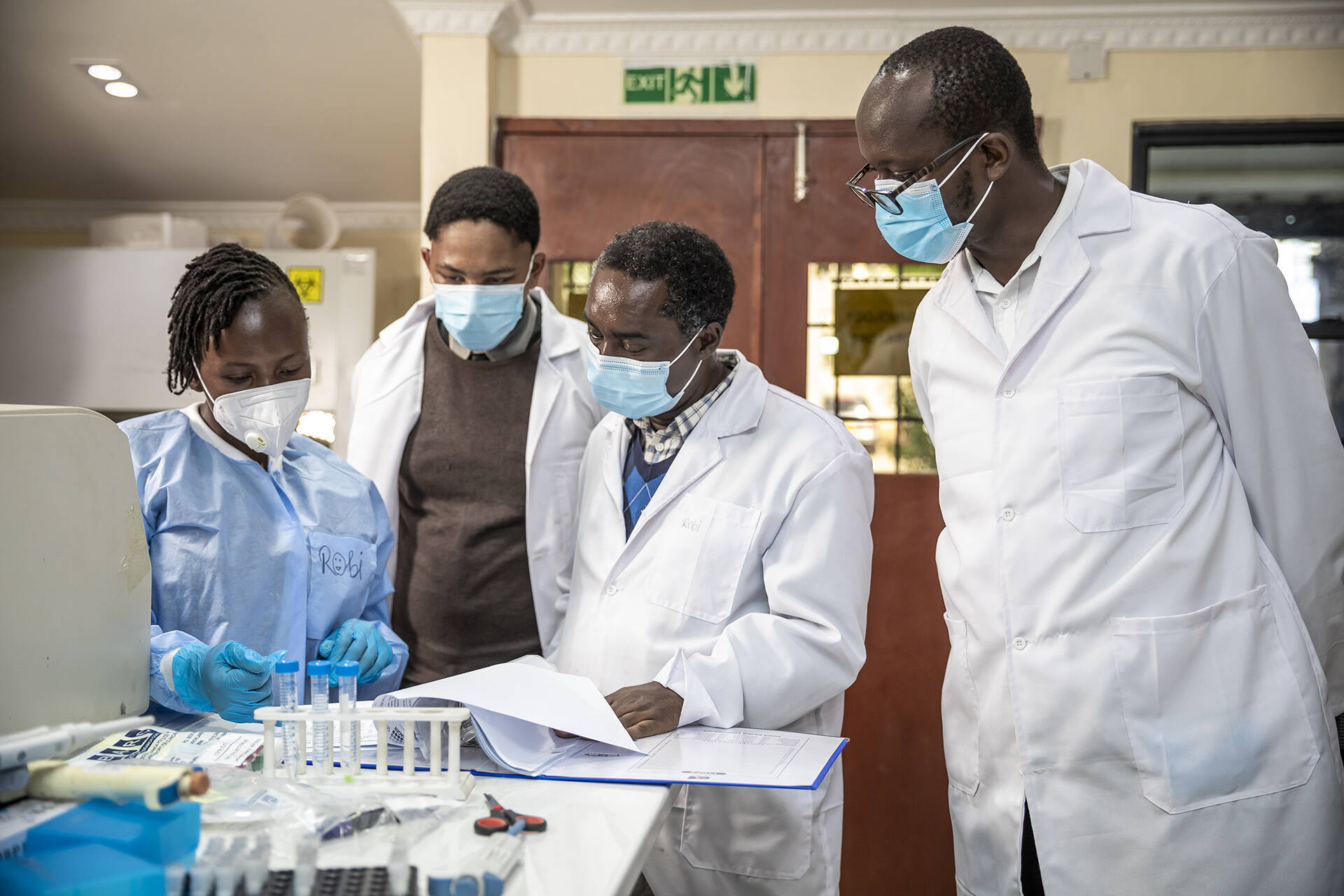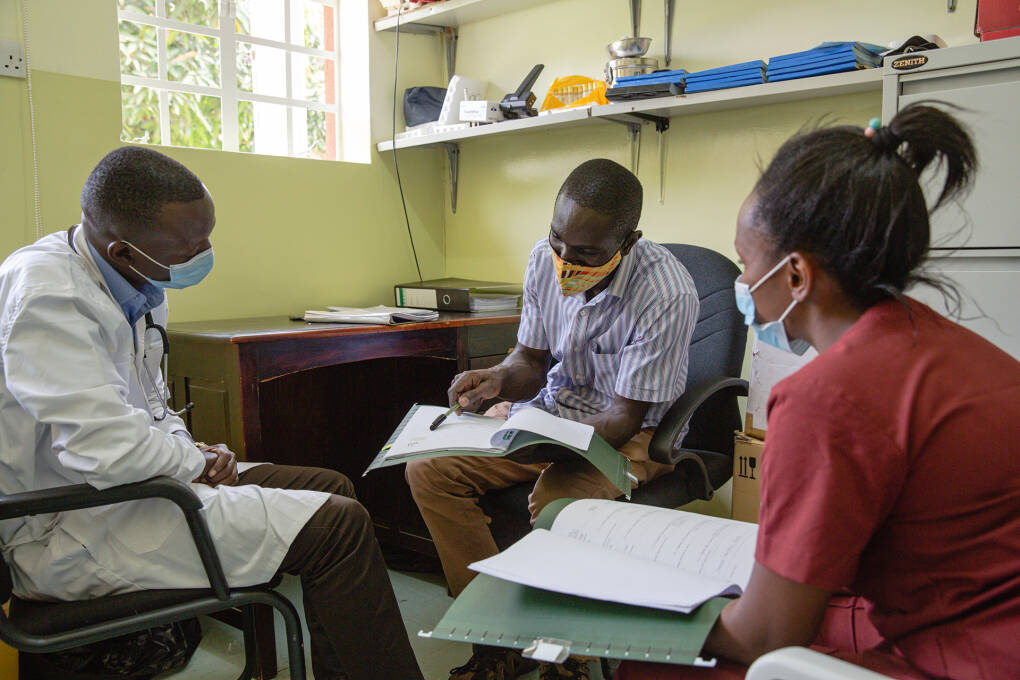
EDCTP regional Networks of Excellence: achievements and new perspectives
Michelle Nderu

Each network is anchored within the four regional economic communities in the WHO-Africa region: the East African Community, the South African Development Community, the Economic Community of Central African States, and the Economic Community of West African States. These regional economic communities directly contribute to science and technology efforts strengthening the research environment in sub-Saharan Africa.
To date, seven laboratories in the networks have successfully achieved and/or maintained their ISO 15189:2012 accreditation. These are: CHU A. Le Dantec in Senegal, Medical Research Council The Gambia in The Gambia; Kenya Medical Research Institute/Centre for Disease Control (Kisian Campus) in Kenya; Medical Research Council–Uganda Virus Research Institute in Uganda; the Central Tuberculosis Reference Laboratory in Tanzania; the Manhiça Health Research Centre in Mozambique; and the Nigerian Institute For Medical Research. These accredited laboratories linked to the networks of excellence are now able to compete globally for high-quality research projects adhering to international standards.
Many institutions in sub-Saharan Africa lack research laboratories that are ISO accredited and comply with standards of Good Clinical and Laboratory Practice. The establishment of the NoEs provided an opportunity for systematic infrastructural upgrades in order to achieve compliance with international requirements
In 2012, EDCTP initiated a laboratory strengthening project within the four regional NoEs to systematically develop 24 clinical research and public health laboratories towards internationally recognised accreditation. The WHO-AFRO Stepwise Laboratory Improvement Process Towards Accreditation (SLIPTA) was used to benchmark and develop the selected laboratories towards accreditation.
Laboratory accreditation
globally applicable short courses required for high-quality clinical studies. This is currently being strengthened by the addition of a regionally harmonised training course to qualify as Clinical Research Associate.
Importantly, it established a regional pool of trained clinical trial monitors to support a high quality of clinical trials across the region. EACCR’s reciprocal monitoring scheme is an innovative, practical and affordable scheme for quality management of health research. The monitors are qualified to be independent monitors, some also having accreditation with the Association of Clinical Research Professionals. To date, several clinical research studies (vaccine trials, drug safety studies, epidemiological studies and longitudinal intervention studies) across Africa have been monitored by EACCR monitors.
The East African Consortium for Clinical Research (EACCR) was set up in 2009. It has been involved in projects on the retention of HIV-infected mothers and their babies in HIV care, and in HIV pharmacovigilance in young people. On malaria, it has been involved in epidemiological studies and clinical trials of artemisinin-based combination therapy and antimalarial resistance. Additionally, the network is successfully collaborating with the East African Community Health Research Commission (EACHRC) on regional sharing of research evidence and actively facilitating researcher-policymaker dialogue.
The network also invests in preparing resource-limited clinical research sites to conduct clinical trials on the infectious diseases that burden the region. EACCR has developed an e-learning centre that hosts peer-reviewed and
EACCR
In October 2020, the Centre for Tuberculosis Research at the Nigeria Institute of Medical Research, was the first laboratory supported under this collaboration to receive international ISO15189:2012 accreditation acknowledging its compliance with this standard for quality management and assurance in medical laboratories. This program is being rolled out to other laboratories in Burkina Faso, Ghana and Nigeria.
WANETAM aims to become a platform facilitating international collaborative research within the West African region. Its relationships with national government authorities have been particularly rewarding as individual countries started developing their management of the COVID-19 pandemic. WANETAM laboratories played a critical and leading role in providing diagnostics services in Burkina Faso, The Gambia, Ghana, Guinea Bissau, Guinea Conakry, Ivory Coast, Mali, Nigeria, and Senegal.
The West African Network for TB, AIDS and Malaria (WANETAM), established in 2009, is building research capacity and continuously collects baseline data to facilitate clinical research. The disease scope is broad: TB diagnosis and treatment, malaria prevention and treatment, HIV-drug resistance as well as clinical surveillance, diagnosis and prevention of neglected or emerging infectious diseases.
The network has active collaborations with Africa Centres for Disease Control and the West Africa Health Organization (WAHO). WAHO and WANETAM have established a framework supporting laboratories in the region to achieve accreditation. WAHO also contracts staff from WANETAM member institutions to conduct assessments of regional laboratories and provide technical assistance in building systems, processes, and procedures necessary for accreditation.
WANETAM
Moreover, the network keeps investing in training activities to strengthen pharmacovigilance, national regulatory authorities and ethics committees, a regional capacity gap which is being addressed with urgency.
Addressing the gender gap in clinical research capacity is another priority area for CANTAM which led it to develop a strategy to involve more women in medical research. The network initiated a project entitled ‘Women and Science’ which promotes ‘Girls in science’ in local schools and aims to mitigate the marginalisation of female scientists through the establishment of a career development fellowship for post-doctoral female researchers in Central Africa. This project is being rolled out across Central Africa via the EDCTP-funded fellowship programme WISE which aims to strengthening gender capacity in clinical research within the CANTAM network.
The Central African Network on TB, HIV and Malaria (CANTAM), established in 2008, has been involved in epidemiological studies on adverse events, antimicrobial resistance, antimalarials, pharmacovigilance, host-directed therapies for tuberculosis, and, most recently, clinical studies on traditional medicines for parasitic and viral infections. The network also actively responded to the Ebola Virus Disease outbreak. Network-trained researchers were deployed to work with national public health institutes in the fight against the disease.
CANTAM developed a flexible, ready-to-apply methodological framework for the implementation of clinical trials and other clinical studies during public health emergencies. It includes regulatory and ethics review steps for managing such outbreaks. This timely developed framework also plays a crucial role in the response to the COVID-19 pandemic in the region.
CANTAM
Currently, most successful research programs in Africa are being carried out by international consortia or networks. Therefore, TESA collaborates with various other networks that operate in the region, e.g. the MOSASWA (Mozambique, South Africa, Swaziland Cross-Border Malaria Initiative), ARISE (Africa Research Initiative and Support Network) and ECRIN (European Research Infrastructure). In addition, TESA has been very active and successful in bringing Namibia, Angola and Eswatini within the network.
The Trials of Excellence in Southern Africa (TESA) was set up in 2009 and is investing in the establishment of an accredited referral data management centre. It already has three referral laboratories in different countries within Southern Africa which serve as training platforms. Experienced TESA research centres also function as training platforms for clinical research studies using an on-the-job training approach.
TESA
The EDCTP regional Networks of Excellence have been synergising their infrastructure, expertise and collaborative connections (at national and regional levels) to strengthen African health research ecosystems. The aim is to make African clinical research collaborations globally competitive and also able to respond to infectious disease outbreaks and pandemics. The COVID-19 pandemic clearly showed the scientific and health care value created in the many years of clinical research capacity building in sub-Saharan Africa.
Competitive and prepared

In 2007, EDCTP funded the creation of four regional networks of research and academic institutions to address gaps in clinical research capacity in sub-Saharan Africa. These networks in western, central, southern and eastern Africa brought together a growing number of different African entities while also involving European partners. The regional Networks of Excellence (NoEs), aimed to improve clinical trial capacity and trial site preparedness in each region, with a focus on poverty-related infectious diseases and emerging/re-emerging infections relevant to Africa.
scroll down

Michelle Nderu
EDCTP regional Networks of Excellence: achievements and new perspectives
scroll down
Each network is anchored within the four regional economic communities in the WHO-Africa region: the East African Community, the South African Development Community, the Economic Community of Central African States, and the Economic Community of West African States. These regional economic communities directly contribute to science and technology efforts strengthening the research environment in sub-Saharan Africa.

In 2007, EDCTP funded the creation of four regional networks of research and academic institutions to address gaps in clinical research capacity in sub-Saharan Africa. These networks in western, central, southern and eastern Africa brought together a growing number of different African entities while also involving European partners. The regional Networks of Excellence (NoEs), aimed to improve clinical trial capacity and trial site preparedness in each region, with a focus on poverty-related infectious diseases and emerging/re-emerging infections relevant to Africa.
Many institutions in sub-Saharan Africa lack research laboratories that are ISO accredited and comply with standards of Good Clinical and Laboratory Practice. The establishment of the NoEs provided an opportunity for systematic infrastructural upgrades in order to achieve compliance with international requirements
In 2012, EDCTP initiated a laboratory strengthening project within the four regional NoEs to systematically develop 24 clinical research and public health laboratories towards internationally recognised accreditation. The WHO-AFRO Stepwise Laboratory Improvement Process Towards Accreditation (SLIPTA) was used to benchmark and develop the selected laboratories towards accreditation. To date, seven laboratories in the networks have successfully achieved and/or maintained their ISO 15189:2012 accreditation. These are: CHU A. Le Dantec in Senegal, Medical Research Council The Gambia in The Gambia; Kenya Medical Research Institute/Centre for Disease Control (Kisian Campus) in Kenya; Medical Research Council–Uganda Virus Research Institute in Uganda; the Central Tuberculosis Reference Laboratory in Tanzania; the Manhiça Health Research Centre in Mozambique; and the Nigerian Institute For Medical Research. These accredited laboratories linked to the networks of excellence are now able to compete globally for high-quality research projects adhering to international standards.
Laboratory accreditation
In October 2020, the Centre for Tuberculosis Research at the Nigeria Institute of Medical Research, was the first laboratory supported under this collaboration to receive international ISO15189:2012 accreditation acknowledging its compliance with this standard for quality management and assurance in medical laboratories. This program is being rolled out to other laboratories in Burkina Faso, Ghana and Nigeria.
WANETAM aims to become a platform facilitating international collaborative research within the West African region. Its relationships with national government authorities have been particularly rewarding as individual countries started developing their management of the COVID-19 pandemic. WANETAM laboratories played a critical and leading role in providing diagnostics services in Burkina Faso, The Gambia, Ghana, Guinea Bissau, Guinea Conakry, Ivory Coast, Mali, Nigeria, and Senegal.
The West African Network for TB, AIDS and Malaria (WANETAM), established in 2009, is building research capacity and continuously collects baseline data to facilitate clinical research. The disease scope is broad: TB diagnosis and treatment, malaria prevention and treatment, HIV-drug resistance as well as clinical surveillance, diagnosis and prevention of neglected or emerging infectious diseases.
The network has active collaborations with Africa Centres for Disease Control and the West Africa Health Organization (WAHO). WAHO and WANETAM have established a framework supporting laboratories in the region to achieve accreditation. WAHO also contracts staff from WANETAM member institutions to conduct assessments of regional laboratories and provide technical assistance in building systems, processes, and procedures necessary for accreditation.
WANETAM
Moreover, the network keeps investing in training activities to strengthen pharmacovigilance, national regulatory authorities and ethics committees, a regional capacity gap which is being addressed with urgency.
Addressing the gender gap in clinical research capacity is another priority area for CANTAM which led it to develop a strategy to involve more women in medical research. The network initiated a project entitled ‘Women and Science’ which promotes ‘Girls in science’ in local schools and aims to mitigate the marginalisation of female scientists through the establishment of a career development fellowship for post-doctoral female researchers in Central Africa. This project is being rolled out across Central Africa via the EDCTP-funded fellowship programme WISE which aims to strengthening gender capacity in clinical research within the CANTAM network.
The Central African Network on TB, HIV and Malaria (CANTAM), established in 2008, has been involved in epidemiological studies on adverse events, antimicrobial resistance, antimalarials, pharmacovigilance, host-directed therapies for tuberculosis, and, most recently, clinical studies on traditional medicines for parasitic and viral infections. The network also actively responded to the Ebola Virus Disease outbreak. Network-trained researchers were deployed to work with national public health institutes in the fight against the disease.
CANTAM developed a flexible, ready-to-apply methodological framework for the implementation of clinical trials and other clinical studies during public health emergencies. It includes regulatory and ethics review steps for managing such outbreaks. This timely developed framework also plays a crucial role in the response to the COVID-19 pandemic in the region.
CANTAM
The East African Consortium for Clinical Research (EACCR) was set up in 2009. It has been involved in projects on the retention of HIV-infected mothers and their babies in HIV care, and in HIV pharmacovigilance in young people. On malaria, it has been involved in epidemiological studies and clinical trials of artemisinin-based combination therapy and antimalarial resistance. Additionally, the network is successfully collaborating with the East African Community Health Research Commission (EACHRC) on regional sharing of research evidence and actively facilitating researcher-policymaker dialogue.
The network also invests in preparing resource-limited clinical research sites to conduct clinical trials on the infectious diseases that burden the region. EACCR has developed an e-learning centre that hosts peer-reviewed and globally applicable short courses required for high-quality clinical studies. This is currently being strengthened by the addition of a regionally harmonised training course to qualify as Clinical Research Associate.
Importantly, it established a regional pool of trained clinical trial monitors to support a high quality of clinical trials across the region. EACCR’s reciprocal monitoring scheme is an innovative, practical and affordable scheme for quality management of health research. The monitors are qualified to be independent monitors, some also having accreditation with the Association of Clinical Research Professionals. To date, several clinical research studies (vaccine trials, drug safety studies, epidemiological studies and longitudinal intervention studies) across Africa have been monitored by EACCR monitors.
EACCR
Currently, most successful research programs in Africa are being carried out by international consortia or networks. Therefore, TESA collaborates with various other networks that operate in the region, e.g. the MOSASWA (Mozambique, South Africa, Swaziland Cross-Border Malaria Initiative), ARISE (Africa Research Initiative and Support Network) and ECRIN (European Research Infrastructure). In addition, TESA has been very active and successful in bringing Namibia, Angola and Eswatini within the network.
The Trials of Excellence in Southern Africa (TESA) was set up in 2009 and is investing in the establishment of an accredited referral data management centre. It already has three referral laboratories in different countries within Southern Africa which serve as training platforms. Experienced TESA research centres also function as training platforms for clinical research studies using an on-the-job training approach.
TESA
The EDCTP regional Networks of Excellence have been synergising their infrastructure, expertise and collaborative connections (at national and regional levels) to strengthen African health research ecosystems. The aim is to make African clinical research collaborations globally competitive and also able to respond to infectious disease outbreaks and pandemics. The COVID-19 pandemic clearly showed the scientific and health care value created in the many years of clinical research capacity building in sub-Saharan Africa.
Competitive and prepared
